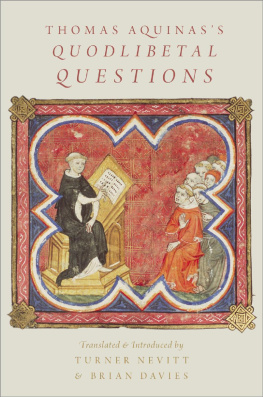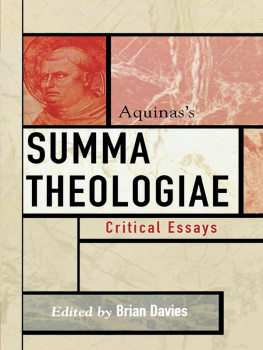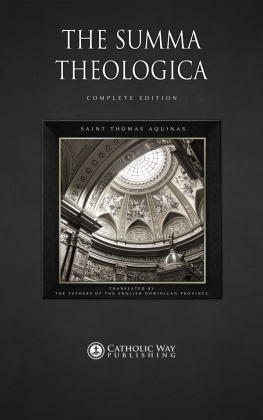Thomas Aquinass Quodlibetal Questions
Thomas Aquinass Quodlibetal Questions
Translated and Introduced by
TURNER NEVITT AND BRIAN DAVIES


Oxford University Press is a department of the University of Oxford. It furthers the Universitys objective of excellence in research, scholarship, and education by publishing worldwide. Oxford is a registered trade mark of Oxford University Press in the UK and certain other countries.
Published in the United States of America by Oxford University Press
198 Madison Avenue, New York, NY 10016, United States of America.
Oxford University Press 2020
All rights reserved. No part of this publication may be reproduced, stored in a retrieval system, or transmitted, in any form or by any means, without the prior permission in writing of Oxford University Press, or as expressly permitted by law, by license, or under terms agreed with the appropriate reproduction rights organization. Inquiries concerning reproduction outside the scope of the above should be sent to the Rights Department, Oxford University Press, at the address above.
You must not circulate this work in any other form and you must impose this same condition on any acquirer.
CIP data is on file at the Library of Congress
ISBN 9780190069537 (pbk.)
ISBN 9780190069520 (hbk.)
ISBN 9780190069551 (epub)
Contents
Thomas Aquinass Quodlibetal Questions have been much neglected by English-speaking readers of Aquinas, and understandably so. It was only in 1996 that a properly critical edition of the Latin text appeared, and there has so far been no complete English translation based on this edition or any other. Also, students of Aquinas have naturally devoted most of their energy to reading and discussing his best-known works, such as the Summa Theologiae and the Summa Contra Gentiles . Yet Aquinas spent a lot of time working on his Quodlibetal Questions , which present his thinking on a huge number of topics, some of which he discusses in other works, but some of which he does not. Indeed, taken overall, the Quodlibetal Questions are unique among Aquinass works, since the questions they treat were not of his own choosing; they came directly from audiences at public disputations over which he presided at the University of Paris. In that sense the Quodlibetal Questions tells us not only a great deal about Aquinas but also about the philosophical and theological interests of his contemporaries.
In this volume we present an English translation of Aquinass Quodlibetal Questions based on the critical Latin edition produced by the Leonine Commission under the direction of Ren-Antoine Gauthier. We also present an introduction designed to give readers a sense of what the Quodlibetal Questions are, how they fit into Aquinass life and works, and what sorts of things they contain. At the end of the volume we provide a list of passages in Aquinass other works that parallel the articles of his Quodlibetal Questions . We also provide a glossary of terms used by Aquinas which may be unfamiliar to some readers, and a glossary of authors and works cited by Aquinas in his Quodlibetal Questions . Our hope is that all students of Aquinas, and of medieval philosophy and theology more generally, will benefit from the present volume, which gives them access to this unique and understudied work.
We are extremely grateful to Adriano Oliva, President of the Leonine Commission, for permitting us to use the critical Latin edition of the Quodlibetal Questions for our translation, and for allowing us to include a selection of the editions notes and parallel passages. We wish to thank him for his helpful comments on our introduction, as well. For help and advice of various kinds we also wish to thank Christopher Arroyo, Kelsey Boor, Marta Borgo, Matthew Glaser, Paul Kucharski, Elizabeth Kuhl, Simon Tugwell, and John Wippel. We are also much indebted to Cynthia Read of Oxford University Press for her patience while waiting for us to deliver this volume.
Our aim with this volume has been to offer a translation of Thomas Aquinass Quodlibetal Questions that is faithful to his Latin while also being readily intelligible to contemporary readers of English. To this end we have broken up Aquinass long sentences into shorter, more readable ones, and have often reproduced the subjects and objects of sentences and clauses. We have also made explicit in the English text certain things that remain only implicit in the Latin. This has meant introducing English words that do not correspond one to one to any words of the Latin text. For example, in , Aquinas addresses the question, Is divine immeasurability incompatible with a plurality of persons? Here we have introduced the adjective divine before persons in order to make it immediately clear what Aquinas is talking about. To give another example, we have translated Aquinass phrase the grace that makes one pleasing as the grace that makes one pleasing to God. For reasons of clarity we have also avoided transliterations such as suppositum and quiddity, which are common in other translations of Aquinas, yet unlikely to be understood by those not already familiar with the technicalities of his thought. Some transliterations and technical terms are unavoidable in any translation of Aquinas. In order to help readers understand these, we have provided a glossary of terms at the end of the volume. We have also provided a glossary of authors and works cited by Aquinas. Our hope is that, with the help of the introduction and glossaries, even those unfamiliar with Aquinass thinking will be able to read and understand his Quodlibetal Questions .
Our translation is based upon the critical edition of Aquinass Latin text produced under the direction of Ren-Antoine Gauthier and published by the Leonine Commission in 1996. With permission from the Leonine Commission, we have reproduced only the barest minimum of the critical editions lengthy and learned footnotes. Our notes are only meant to direct readers to the sources from which Aquinas quotes or to which he alludes. We have followed the critical editions convention of using italics to indicate these quotations and allusions, for a number of reasons. Medieval Latin texts lack contemporary forms of style and punctuation such as italics, commas, quotation marks, and so on. This makes it difficult to determine where a quotation given by Aquinas begins and ends. It also makes it difficult to determine when he is quoting rather than merely alluding to a text. Even when he is obviously quoting, his quotation is often different from the original text from which he quotes. To cite just one of countless , reads, All creation becomes insignificant to the soul that sees God. But the original text actually says, All creation is insignificant to the soul that sees the creator . As this example shows, Aquinass quotations are often partial paraphrases or interpretations or reformulations rather than completely verbatim excerpts. This is especially true of his biblical quotations, in which text and exegesis are often seamlessly interwoven. For these and other reasons, the use of quotation marks to indicate Aquinass use of texts would be very difficult, if not impossible, and also very misleading, since his approach to authoritative texts was so very different from our own. That is why we have followed the critical editions prudent use of italics to indicate when Aquinas uses the exact same word that appears in the original text from which he quotes or to which he alludes. This allows readers to see the relationship between the original text and Aquinass own use of it, and the role he played in its reception.











